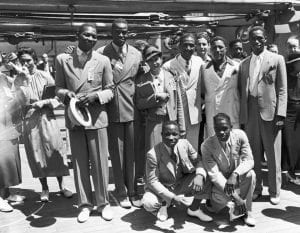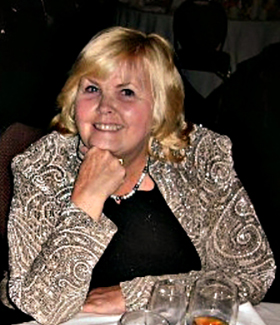‘Olympic Pride, American Prejudice’ A Great Historical Film
NOTE: Nationally known film critic Connie Corcoran Wilson is providing coverage of this year’s Chicago International Film Festival for QuadCities.com.
 “Olympic Pride, American Prejudice”: The Untold Story of the 1936 Olympics is a gripping film.
“Olympic Pride, American Prejudice”: The Untold Story of the 1936 Olympics is a gripping film.
This film from Director Deborah Riley Draper examined the 28 athletes who traveled to Berlin in 1936 for the Olympic games held when Hitler was in power. Everyone remembers the name Jesse Owens from those games. But there were 17 other African American or Jewish athletes who participated as part of the U.S. team of 400 who remain largely forgotten, and this film tells their story.
THE GOOD
Over four years of time, newsreel footage was assembled of all the participants, including spending much time in Berlin and Cologne. German families who had attended the Olympics contributed family photos. Director Draper told the crowd at the Chicago screening, “It came to life for me here. It was very special. It was a confirmation of stories we had been told.
They were powerful and extraordinary and beautiful.”
Even more interesting was Draper’s acknowledgement that she was originally working on a story of a woman from the South who had been imprisoned in a Nazi prison. But, as she said, “These athletes competed 30 years before Wilma Randolph. The irony and paradox of that was intriguing. It was astonishing to know that these women had been part of the 400-member Olympic team.” Draper hinted that the story of that female prisoner in Germany might still get her day on film in the future.
Asked if there were other black athletes participating, Draper mentioned those from Haiti, Brazil and Egypt, but reinforced that Hitler wanted to use the Olympics as a propaganda machine to sell his theory of white racial superiority. Hitler was sorely set back in this goal when Jesse Owens won 4 gold medals and the black athletes, as a group, won half of the total U.S. medal count, including 8 gold medals. The African American contingent won all but 2 events in which they competed. In fact, Hitler stormed from the stadium after one such African American win and the Olympic committee had to tell him to either greet all winners or none. He chose the latter, but met with German winners privately in his box to congratulate them on their victories.
Draper’s film not only documents the lead-up to the games (some felt the U.S. should boycott the Olympics entirely, as the U.S. did in Russia under President Jimmy Carter), but there is a post that tells what happened to the athletes after the games, and it is nearly as heartbreaking as the stories of racial prejudice and religious injustice that are documented by the film.
The injustices were not just perpetrated on blacks. Two Jewish athletes who were supposed to run track and field (Glickman of Syracuse and Stoller of Michigan) were pulled from competition in order to use Caucasian runners at the last minute, prompting Jewish contestant Marty Glickman to confront the coach and ask, “Is it because I’m Jewish that I wasn’t allowed to run?”
The same pulling at the last minute technique occurred with Louise Stokes, who was replaced at the last moment and never got to run another race because of racial politics, while the women’s 80-meter-hurdles contestant, Tydee Pickett of Chicago, broke her foot when the hurdle in German didn’t “give’ as they had in the U.S.
One of the worst cases of the unfairness of Hitler’s regime was the story of Greta Bergmann, a German national who fled to England and was slated to compete for the British team when Hitler sent word that she needed to return to Germany and compete for the Motherland. Bergmann returned, but was refused the right to participate and, to add insult to injury, had all her records expunged. Bergmann, who was still alive, described the ordeal as “a terrible time.”
Two boxers who traveled the 10 days across the ocean on the S.S. Manhattan to compete, Joe Church and Howell King, were sent home with weak excuses that they were “homesick.”
Howell King was even told he would have to box against the man he had already beaten once (Rutecke), which he did, beating him again on board the boat.
The black athletes were frequently chased from the movies shown aboard ship, were not able to train, in some cases (notably, Tydee Picket) were seasick and the ship had to stop in England to take on more food during the 10-day voyage. The Olympic Black Gang, as they were known, or the Black Eagles as the boxers were called, were, however, treated extremely well by the Germans, who wanted to dispel rumors of Nazi persecution of minorities. The Nazis orchestrated every aspect of the games, staged them, choreographed them, for propaganda purposes, with Lennie Riefenstahl (“Triumph of the Will”) documenting it all on film for the Third Reich after convincing Hitler that the films would prove the Aryan race was superior.
There were 100,000 spectators in the stadium with the (doomed) Hindenberg shown hovering overhead, and 49 nations competing. As the U.S. athletes entered the stadium to the strains of “The Star-Spangled Banner” German authorities orchestrated it in such a manner that the German team then entered and 5,000 German voices sang the Hallelujah chorus and “Deutschland Uber Alles” while hordes of pigeons were released, drowning out the United States national anthem, which ceased being played. Werner Viehs, a spectator who was aged 10 at the time. remembered the spectacle. All agreed that some of the pigeons left their mark on the U.S. team before they departed the stadium.
Mack Robinson, older brother of Jackie Robinson, was one of the competitors, winning a silver medal. He could only get a job sweeping streets after his return and wore his Olympic jacket at night to stay warm. Jesse Owens was penalized for not touring other European countries to help raise money for the Olympic Committee. He was banned, stripped of his amateur status and ended up having to race against racehorses to make money upon his return to the U.S. As Draper put it, “The country turned its back on him.” It was a far cry from the German











